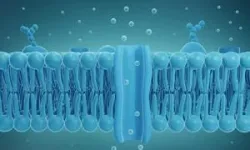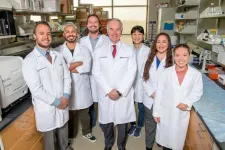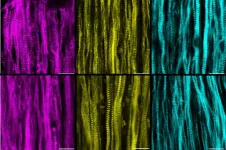(Press-News.org) Chronic pain affects millions worldwide, and current treatments often rely on opioids, which carry risks of addiction and overdose.
Non-addictive alternatives could revolutionize pain management, and new research targeting the human protein which regulates cold sensations, brings scientists closer to developing pain medications that don't affect body temperature and don't carry the risks of addiction.
Research published in Science Advances on June 21, led by Wade Van Horn, professor in Arizona State University’s School of Molecular Sciences and Biodesign Center for Personalized Diagnostics, has uncovered new insights into the main human cold and menthol sensor TRPM8 (transient receptor potential melastatin 8). Using techniques from many fields like biochemistry and biophysics, their study revealed that it was a chemical sensor before it became a cold temperature sensor.
“If we can start to understand how to decouple the chemical sensing of cold from actual cold sensing, in theory, we could make side-effect-free drugs,” said Van Horn whose research focuses on membrane proteins involved in human health and disease. "By understanding the evolutionary history of TRPM8, we hope to contribute to designing better drugs that offer relief without the dangerous side effects associated with current painkillers."
When a person touches a metal desk and it feels cold, the human body activates TRPM8. For cancer patients who are on certain kinds of chemotherapeutics, touching a desk can hurt. TRPM8 is also involved in many other types of pain as well, including chronic neuropathic and inflammatory pain.
By further understanding this specificity of the chemical sensing of cold versus physically sensing cold, scientists can target relief without triggering the temperature regulation side effects often seen in TRPM8 clinical trials for pain treatments.
In the research, the team used ancestral sequence reconstruction, a time machine for proteins of sorts, compiling the family tree of TRPM8 that exists today and then used that information to determine what the proteins from long-extinct animals might have looked like.
Using computational methods to resurrect ancestral primate, mammalian, and vertebrate TRPM8, the researchers were able to understand how TRPM8 has changed over hundreds of millions of years by comparing the sequences of current proteins to predict the sequences of their ancient ancestors. Additionally, the combination of lab experiments and computational studies enable the researchers to identify critical places in TRPM8 that allow a more clear understanding of temperature sensing, which can be tested in subsequent experiments.
“Comparative dynamics analysis of ancestral and human TRPM8 also supports the experimental data and will allow us to identify critical sites in temperature sensing, which we will be testing soon,” said Banu Ozkan, professor in ASU’s Department of Physics, who was involved in the study.
The team then expressed these ancestral TRPM8s in human cells and characterized them using various cellular and electrophysiology techniques.
“Ancestral protein-based studies allow us to focus on the lineage of most interest, such as human TRPM8, to alleviate concerns arising in drug discovery from speciation differences, like in mice and humans,” said first author on the study Dustin Luu, an ASU School of Molecular Sciences doctoral alumnus, and current postdoctoral fellow in ASU’s Biodesign Center for Personalized Diagnostics.
Luu continued: “We discovered that surprisingly menthol sensing appeared way before cold sensing. The difference in appearance and attenuation of these activation modes suggest they are separate and can be disentangled with further research enabling new pain therapies without the adverse side effect in thermal sensing and thermal regulation, which has plagued TRPM8-targeted clinical trials.”
As science continues to uncover the mysteries of our biological mechanisms, studies like this exemplify how evolutionary biology and modern pharmacology can collaborate to address pressing medical needs and improve the quality of life for those suffering from chronic pain.
Additional researchers involved in the study include Banu Ozkan, Nikhil Ramesh, and I. Can Kazan from Arizona State University’s Department of Physics; Karan Shah from ASU’s School of Molecular Sciences; Gourab Lahiri and Miyeko Mana from ASU’s School of Life Sciences.
END
Chilling discovery: Study reveals evolution of human cold and menthol sensing protein, offering hope for future non-addictive pain therapies.
Menthol sensing appeared long before cold sensing, suggesting distinct activation modes that can be disentangled, paving the way for new pain therapies without adverse thermal side effects.
2024-06-21
ELSE PRESS RELEASES FROM THIS DATE:
Elena Beccalli, new rector of Università Cattolica del Sacro Cuore, takes office on 1st July
2024-06-21
Elena Beccalli will be rector of the Università Cattolica del Sacro Cuore on 1st July for the four-year term 2024–2028. After being appointed by the University's Board of Directors, which convened today, Thursday 20 June 2024, Professor Beccalli succeeds Professor Franco Anelli. She is the first woman appointed to this role in the history of our university.
The decision of the Board of Directors follows the appointment of Professor Elena Beccalli, Dean of the School of Banking, Finance, and Insurance ...
Pacific Northwest Research Institute uncovers hidden DNA mechanisms of rare genetic diseases
2024-06-21
Seattle, WA — June 21, 2024 — Researchers at the Pacific Northwest Research Institute (PNRI) and collaborating institutions have made a groundbreaking discovery that could significantly advance our understanding of genomic disorders. Their latest study, funded by the National Institutes of Health[1] and published in the journal Cell Genomics, reveals how specific DNA rearrangements called inverted triplications contribute to the development of various genetic diseases.
Understanding the Study
Genomic disorders occur when there are changes or mutations in DNA that disrupt normal biological functions. These can lead ...
Empowering older adults: Wearable tech made easier with personalized support
2024-06-21
(Toronto, June 20, 2024) A new review in the Journal of Medical Internet Research, published by JMIR Publications, found that community-dwelling older adults are more likely to continue using wearable monitoring devices (WMDs), like trackers, pedometers, and smartwatches, if they receive support from health care professionals or peers.
The research team from The Hong Kong Polytechnic University, led by Dr. Arkers Kwan Ching Wong, reviewed data from 3 randomized controlled trials involving over 150 older adults. The evaluation showed that the interventions that focused on increasing awareness of being monitored and used collaborative goal-setting and feedback tools, such as the SystemCHANGE ...
Pennington Biomedical researchers partner on award-winning Long Covid study
2024-06-21
Dr. John Kirwan, Executive Director of Pennington Biomedical Research Center, is serving as a co-principal investigator on the Pathobiology in RECOVER of Metabolic and Immune Systems, or PROMIS, study. The study has been awarded more than $802,000 by the National Institutes of Health to identify potential causes of Long COVID.
“The PROMIS study will help us better understand what is driving Long COVID,” Dr. Kirwan said. “In the early days of the pandemic, Pennington Biomedical directed its resources to address the urgent health needs of our population. Now with estimates that more than 25 percent of people in the U.S. who had COVID have experienced ...
Cooling ‘blood oranges’ could make them even healthier – a bonus for consumers
2024-06-21
An orange teeming with antioxidants and other health benefits may be a shot in the arm for consumers and citrus growers, if the fruit is stored at cool temperatures, a new University of Florida study shows.
But it’s too soon to know if the so-called “blood oranges” are a viable crop for the Florida citrus industry, says Ali Sarkhosh, a UF/IFAS associate professor of horticultural sciences. Sarkhosh’s post-doctoral associate Fariborz Habibi explains further.
“Although blood oranges typically command higher prices than other common varieties, such as navel or ...
Body image and overall health found important to the sexual health of older gay men, according to new studies
2024-06-21
According to a National Poll on Healthy Aging, 93% of people in the U.S. between 50-80 years old report experiencing at least one form of ageism from other people. Internalized ageism is when a person believes ageist ideas about themselves, such as thinking they had a “senior moment” or thinking they are too old to learn new technology. Internalizing ageist stereotypes can impact older people’s mental and physical health, including sexual health. Various aspects of older adults’ sexual ...
Lab-grown muscles reveal mysteries of rare muscle diseases
2024-06-21
DURHAM, N.C. – Biomedical engineers at Duke University have developed a new technique to better understand and test treatments for a group of extremely rare muscle disorders called dysferlinopathy or limb girdle muscular dystrophies 2B (LGMD2B). The approach grows complex, functional 3D muscle tissue from stem cells in the laboratory, creating a platform that replicates patient symptoms and treatment responses.
In its debut study, researchers reveal some of the biological mechanisms underlying the characteristic loss of mobility caused by LGMD2B. They also demonstrate that a combination of existing treatments may be able to alleviate some ...
Primary hepatic angiosarcoma: Treatment options for a rare tumor
2024-06-21
“[...] PHA is a rare yet aggressive mesenchymal tumor of the liver, which requires a multi-disciplinary approach to achieve the best patient outcomes.”
BUFFALO, NY- June 21, 2024 – A new editorial paper was published in Oncoscience (Volume 11) on May 20, 2024, entitled, “Primary hepatic angiosarcoma: Treatment options for a rare tumor.”
In this new editorial, researchers Gregory L. Guzik and Ankit Mangla from University Hospitals Cleveland Medical Center, University Hospitals Seidman Cancer ...
Research finds causal evidence tying cerebral small-vessel disease to Alzheimer’s, dementia
2024-06-21
SAN ANTONIO, June 21, 2024 – Research led by in part by The University of Texas Health Science Center at San Antonio (UT Health San Antonio) finds that the most common cerebral small-vessel disease feature seen in brain magnetic resonance imaging is a primary vascular factor associated with dementia risk.
Results of the major international study emphasize the significance of that feature, known as white matter hyperintensity (WMH) burden, in preventive strategies for dementia.
“Our findings provide converging evidence that WMH is a major vascular factor ...
Navigating the Pyrocene: Recent Cell Press papers on managing fire risk
2024-06-21
As wildfires become more intense and the fire season grows longer across parts of the world, humans will need to adapt. In this collection of papers from Cell Press journals One Earth and Cell Reports Sustainability, an intersection of fire management researchers comment on what needs to change to ensure we can collaborate across stakeholders in a more fire-resistant future.
The papers are publishing in advance of a Cell Press 50th Anniversary sustainabiltiy forum on the topic of “Navigating the Pyrocene: Managing fire risk in a warming world.” The virtual event, free to register, takes place Thursday, July 11, 2024 at 11:00 am ET.
This ...
LAST 30 PRESS RELEASES:
COVID-19 vaccination during pregnancy may help prevent preeclampsia
Menopausal hormone therapy not linked to increased risk of death
Chronic shortage of family doctors in England, reveals BMJ analysis
Booster jabs reduce the risks of COVID-19 deaths, study finds
Screening increases survival rate for stage IV breast cancer by 60%
ACC announces inaugural fellow for the Thad and Gerry Waites Rural Cardiovascular Research Fellowship
University of Oklahoma researchers develop durable hybrid materials for faster radiation detection
Medicaid disenrollment spikes at age 19, study finds
Turning agricultural waste into advanced materials: Review highlights how torrefaction could power a sustainable carbon future
New study warns emerging pollutants in livestock and aquaculture waste may threaten ecosystems and public health
Integrated rice–aquatic farming systems may hold the key to smarter nitrogen use and lower agricultural emissions
Hope for global banana farming in genetic discovery
Mirror image pheromones help beetles swipe right
Prenatal lead exposure related to worse cognitive function in adults
Research alert: Understanding substance use across the full spectrum of sexual identity
Pekingese, Shih Tzu and Staffordshire Bull Terrier among twelve dog breeds at risk of serious breathing condition
Selected dog breeds with most breathing trouble identified in new study
Interplay of class and gender may influence social judgments differently between cultures
Pollen counts can be predicted by machine learning models using meteorological data with more than 80% accuracy even a week ahead, for both grass and birch tree pollen, which could be key in effective
Rewriting our understanding of early hominin dispersal to Eurasia
Rising simultaneous wildfire risk compromises international firefighting efforts
Honey bee "dance floors" can be accurately located with a new method, mapping where in the hive forager bees perform waggle dances to signal the location of pollen and nectar for their nestmates
Exercise and nutritional drinks can reduce the need for care in dementia
Michelson Medical Research Foundation awards $750,000 to rising immunology leaders
SfN announces Early Career Policy Ambassadors Class of 2026
Spiritual practices strongly associated with reduced risk for hazardous alcohol and drug use
Novel vaccine protects against C. diff disease and recurrence
An “electrical” circadian clock balances growth between shoots and roots
Largest study of rare skin cancer in Mexican patients shows its more complex than previously thought
Colonists dredged away Sydney’s natural oyster reefs. Now science knows how best to restore them.
[Press-News.org] Chilling discovery: Study reveals evolution of human cold and menthol sensing protein, offering hope for future non-addictive pain therapies.Menthol sensing appeared long before cold sensing, suggesting distinct activation modes that can be disentangled, paving the way for new pain therapies without adverse thermal side effects.







